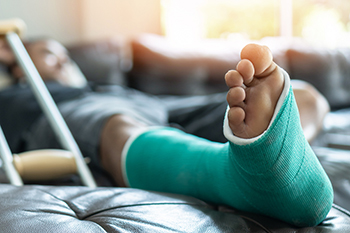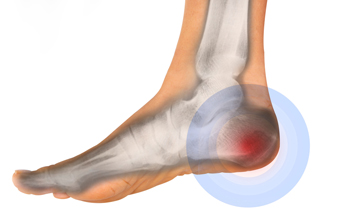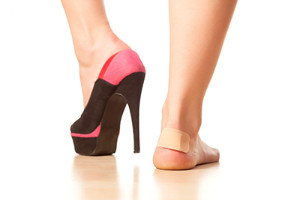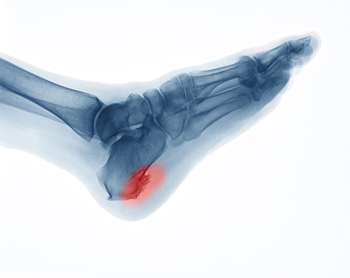Items filtered by date: May 2022
Ankle Fractures in Children

An ankle fracture in children involves at least one bone break in your child’s ankle. Common symptoms of an ankle fracture include pain, tenderness, swelling, bruising, and trouble moving or putting weight on the ankle or foot. This type of injury is diagnosed with an X-ray, ultrasound, CT, or MRI. A podiatrist will usually treat a child’s ankle break with a supportive device, such as a cast or brace, and crutches are often provided to help keep weight off the affected ankle. If the fracture is severe, surgery may be needed. Resting the ankle, applying ice, compressing, and elevating the ankle should all help in healing. If you think your child has a broken ankle, it is suggested you visit a podiatrist for proper diagnosis and a treatment plan that best suits your child’s injury.
Broken ankles need immediate treatment. If you are seeking treatment, contact Nrup Tolat, DPM from Atlanta Total Foot & Ankle Care. Our doctor can provide the care you need to keep you pain-free and on your feet.
Broken Ankles
A broken ankle is experienced when a person fractures their tibia or fibula in the lower leg and ankle area. Both of these bones are attached at the bottom of the leg and combine to form what we know to be our ankle.
When a physician is referring to a break of the ankle, he or she is usually referring to a break in the area where the tibia and fibula are joined to create our ankle joint. Ankles are more prone to fractures because the ankle is an area that suffers a lot of pressure and stress. There are some obvious signs when a person experiences a fractured ankle, and the following symptoms may be present.
Symptoms of a Fractured Ankle
- Excessive pain when the area is touched or when any pressure is placed on the ankle
- Swelling around the area
- Bruising of the area
- Area appears to be deformed
If you suspect an ankle fracture, it is recommended to seek treatment as soon as possible. The sooner you have your podiatrist diagnose the fracture, the quicker you’ll be on the way towards recovery.
If you have any questions, please feel free to contact our offices located in Woodstock and Atlanta, GA . We offer the newest diagnostic and treatment technologies for all your foot care needs.
Reminder: When Was the Last Time...?
Causes of Heel Pain

When you pound your feet on hard surfaces during sports, running, or other activities, the heels take the brunt of this pressure. It’s not surprising that they will begin to hurt. The most common heel pain complaint is from plantar fasciitis, where the band of tissue that connects the heel to the toes becomes inflamed. Other heel problems include stress fractures, nerve entrapment, and heel pad syndrome, which can be the result of aging or repetitive stress. Achilles tendonitis, pain in the back of heel, occurs when a tendon that attaches the heel to the leg bone becomes inflamed, stretched or even ruptured. Other causes of heel pain include wearing shoes with poor cushioning, tight calf muscles, and sudden inward or outward turning of the feet. Landing hard on the heels, especially from a height, can also bruise or even fracture the bones. If your heel pain continues or worsens, it is best to consult with a podiatrist for a thorough examination of the area affected and appropriate treatment options.
Many people suffer from bouts of heel pain. For more information, contact Nrup Tolat, DPM of Atlanta Total Foot & Ankle Care. Our doctor can provide the care you need to keep you pain-free and on your feet.
Causes of Heel Pain
Heel pain is often associated with plantar fasciitis. The plantar fascia is a band of tissues that extends along the bottom of the foot. A rip or tear in this ligament can cause inflammation of the tissue.
Achilles tendonitis is another cause of heel pain. Inflammation of the Achilles tendon will cause pain from fractures and muscle tearing. Lack of flexibility is also another symptom.
Heel spurs are another cause of pain. When the tissues of the plantar fascia undergo a great deal of stress, it can lead to ligament separation from the heel bone, causing heel spurs.
Why Might Heel Pain Occur?
- Wearing ill-fitting shoes
- Wearing non-supportive shoes
- Weight change
- Excessive running
Treatments
Heel pain should be treated as soon as possible for immediate results. Keeping your feet in a stress-free environment will help. If you suffer from Achilles tendonitis or plantar fasciitis, applying ice will reduce the swelling. Stretching before an exercise like running will help the muscles. Using all these tips will help make heel pain a condition of the past.
If you have any questions please contact our offices located in Woodstock and Atlanta, GA . We offer the newest diagnostic and treatment technologies for all your foot and ankle needs.
Foot Conditions That May Come From Wearing High Heels

Many people stopped wearing high heels during last year's lockdown. People who have chosen to resume wearing high heels as more social and workplaces open up may be experiencing foot pain. This may be a result of a shortened Achilles tendon and may take time to adjust when high heels are worn again. There are foot conditions that may develop as a result of frequently wearing high heels, including plantar fasciitis, bunions, and hammertoes. Additionally, ailments consisting of Morton’s neuroma and corns may cause pain from wearing high heels. The good news is that high heels can be worn as desired when the heels that are chosen are not higher than an inch and a half. This can give the appearance that is wanted and the feet can be protected at the same time. If you have questions about how high heels can affect the feet, please feel free to confer with a podiatrist who can address any concerns you may have.
High heels have a history of causing foot and ankle problems. If you have any concerns about your feet or ankles, contact Nrup Tolat, DPM from Atlanta Total Foot & Ankle Care. Our doctor can provide the care you need to keep you pain-free and on your feet.
Effects of High Heels on the Feet
High heels are popular shoes among women because of their many styles and societal appeal. Despite this, high heels can still cause many health problems if worn too frequently.
Which Parts of My Body Will Be Affected by High Heels?
- Ankle Joints
- Achilles Tendon – May shorten and stiffen with prolonged wear
- Balls of the Feet
- Knees – Heels cause the knees to bend constantly, creating stress on them
- Back – They decrease the spine’s ability to absorb shock, which may lead to back pain. The vertebrae of the lower back may compress.
What Kinds of Foot Problems Can Develop from Wearing High Heels?
- Corns
- Calluses
- Hammertoe
- Bunions
- Morton’s Neuroma
- Plantar Fasciitis
How Can I Still Wear High Heels and Maintain Foot Health?
If you want to wear high heeled shoes, make sure that you are not wearing them every day, as this will help prevent long term physical problems. Try wearing thicker heels as opposed to stilettos to distribute weight more evenly across the feet. Always make sure you are wearing the proper shoes for the right occasion, such as sneakers for exercising. If you walk to work, try carrying your heels with you and changing into them once you arrive at work. Adding inserts to your heels can help cushion your feet and absorb shock. Full foot inserts or metatarsal pads are available.
If you have any questions please feel free to contact our offices located in Woodstock and Atlanta, GA . We offer the newest diagnostic and treatment technologies for all your foot and ankle needs.
Children Can Experience Heel Pain Too

It may be difficult for you to know if your child is having heel pain because it is not often associated with children. However, certain conditions that cause heel pain can afflict the young, even if they do not know how to properly communicate their distress. Sever’s disease, for instance, is a form of heel pain that stems from irritation to the growth plate in the heels of growing children. Children can also develop plantar fasciitis from overuse of the heel or wearing shoes that do not fit. This condition is a painful inflammation of the plantar fascia tissue that connects to the heel to the toes. Active children can also develop tiny stress fractures of the heel bone which can occur gradually over time and be quite painful. There are certain clues your child’s condition may provide if you know what to look for. If your child limps or changes the way they walk or run, cuts back on physical activities, complains that their feet or heels feel odd or stiff, or that something is stuck in their shoe, they may have a painful heel condition. It is suggested that you make an appointment for your child with a podiatrist to have your child’s condition diagnosed and treated properly.
Making sure that your children maintain good foot health is very important as they grow. If you have any questions, contact Nrup Tolat, DPM of Atlanta Total Foot & Ankle Care. Our doctor can provide the care you need to keep you pain-free and on your feet.
Keeping Children's Feet Healthy
Having healthy feet during childhood can help prevent medical problems later in life, namely in the back and legs. As children grow, their feet require different types of care. Here are some things to consider...
Although babies do not walk yet, it is still very important to take care of their feet.
Avoid putting tight shoes or socks on his or her feet.
Allow the baby to stretch and kick his or her feet to feel comfortable.
As a toddler, kids are now on the move and begin to develop differently. At this age, toddlers are getting a feel for walking, so don’t be alarmed if your toddler is unsteady or ‘walks funny’.
As your child gets older, it is important to teach them how to take care of their feet.
Show them proper hygiene to prevent infections such as fungus.
Be watchful for any pain or injury.
Have all injuries checked by a doctor as soon as possible.
Comfortable, protective shoes should always be worn, especially at play.
If you have any questions please feel free to contact our offices located in Woodstock and Atlanta, GA . We offer the newest diagnostic and treatment technologies for all your foot and ankle needs.
Standing for Long Periods of Time May Cause a Heel Spur

Research has shown that for every mile walked, there are sixty tons of stress that goes through the foot. Heel pain can indicate a heel spur may have developed and can become worse without proper treatment. It is defined as a bony growth that forms at the base of the heel and can cause severe pain and discomfort. This condition can come from standing on your feet for most of the day, or from wearing shoes that do not fit correctly. Some patients find it helpful to practice specific stretching exercises, and this may help them to find mild relief. Additionally, when proper stretches are performed, it may give the foot the ability to have increased range of motion and flexibility. Obese patients may find it beneficial to lose extra pounds and wearing heel pads may provide temporary relief from the heel spur. If you have developed this ailment, it is suggested that you are under the care of a podiatrist who can properly treat heel spurs.
Heel spurs can be incredibly painful and sometimes may make you unable to participate in physical activities. To get medical care for your heel spurs, contact Nrup Tolat, DPM from Atlanta Total Foot & Ankle Care. Our doctor will do everything possible to treat your condition.
Heels Spurs
Heel spurs are formed by calcium deposits on the back of the foot where the heel is. This can also be caused by small fragments of bone breaking off one section of the foot, attaching onto the back of the foot. Heel spurs can also be bone growth on the back of the foot and may grow in the direction of the arch of the foot.
Older individuals usually suffer from heel spurs and pain sometimes intensifies with age. One of the main condition's spurs are related to is plantar fasciitis.
Pain
The pain associated with spurs is often because of weight placed on the feet. When someone is walking, their entire weight is concentrated on the feet. Bone spurs then have the tendency to affect other bones and tissues around the foot. As the pain continues, the feet will become tender and sensitive over time.
Treatments
There are many ways to treat heel spurs. If one is suffering from heel spurs in conjunction with pain, there are several methods for healing. Medication, surgery, and herbal care are some options.
If you have any questions feel free to contact our offices located in Woodstock and Atlanta, GA . We offer the latest in diagnostic and treatment technology to meet your needs.

